 Petzlover
Petzlover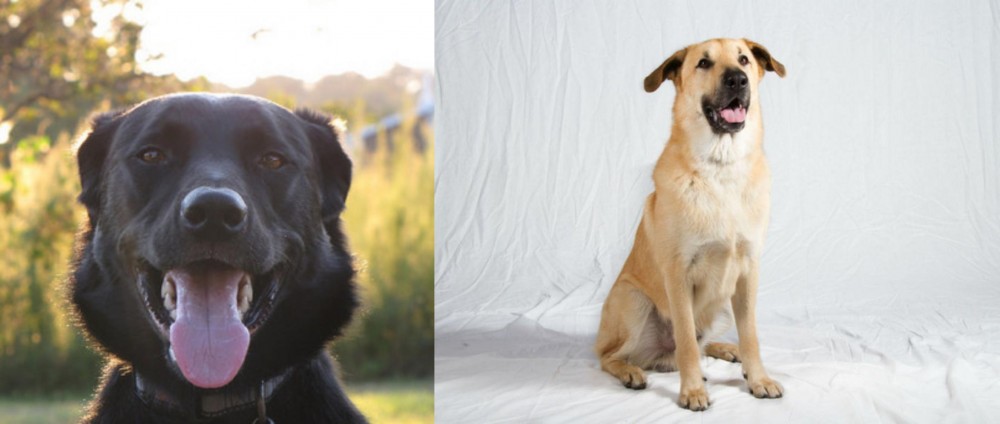 Both Borador and Chinook are originated from United States. Borador may grow 12 cm / 4 inches shorter than Chinook. Borador may weigh 15 kg / 33 pounds lesser than Chinook. Both Borador and Chinook has same life span. Both Borador and Chinook has almost same litter size. Borador requires Moderate Maintenance. But Chinook requires High Maintenance
Both Borador and Chinook are originated from United States. Borador may grow 12 cm / 4 inches shorter than Chinook. Borador may weigh 15 kg / 33 pounds lesser than Chinook. Both Borador and Chinook has same life span. Both Borador and Chinook has almost same litter size. Borador requires Moderate Maintenance. But Chinook requires High Maintenance
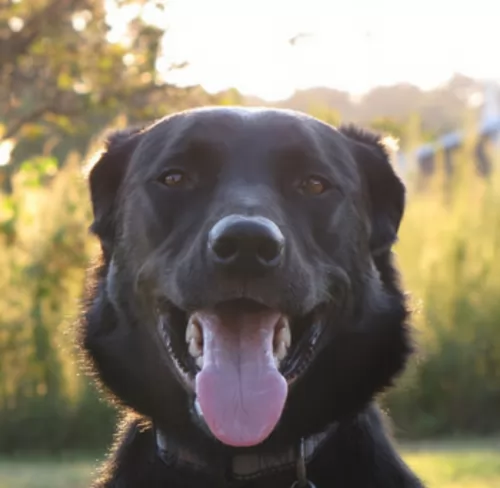 Hybrid breeds have become popular in the last decade or so. The Borador, hailing from Northern America, is one of these popular crossbreeds between two very popular dog breeds - the Border Collie and the Labrador Retriever. Between the two dog breeds, you get extraordinary intelligence, energy and a wonderful temperament.
Hybrid breeds have become popular in the last decade or so. The Borador, hailing from Northern America, is one of these popular crossbreeds between two very popular dog breeds - the Border Collie and the Labrador Retriever. Between the two dog breeds, you get extraordinary intelligence, energy and a wonderful temperament.
You first started hearing about this dog breed in the early 21st century. However each of the two breeds brought together to produce the Borador have got reasonable lengthy histories.
 In the early 20th century, in the small town of Wonalancet, New Hampshire a new breed of dog called the Chinook was born. Developed by Arthur Treadwell Walden, the breed is named after the first male ancestor who was named Chinook. The breed is a rare sled dog and the official dog of the state of New Hampshire. The Chinook was born of a cross between a large Mastiff-like street dog and huskies that were part of the Peary North Pole expedition.
In the early 20th century, in the small town of Wonalancet, New Hampshire a new breed of dog called the Chinook was born. Developed by Arthur Treadwell Walden, the breed is named after the first male ancestor who was named Chinook. The breed is a rare sled dog and the official dog of the state of New Hampshire. The Chinook was born of a cross between a large Mastiff-like street dog and huskies that were part of the Peary North Pole expedition.
Walden was an experienced slender and looking for a dog that was stronger, faster and had more stamina than his current sled dogs. Walden had years of experience including being the trainer and lead on Byrd’s 1929 Antarctic expedition and plenty of Yukon experience. Once he had the male Chinook he bred him with German Shepherds, Belgian Sheepdogs and Canadian Eskimo Dogs at the very least. He then bred those puppies back to Chinook until he had the type and traits he wanted. Following Walden, Julia Lombard and then Perry Greene took over mastery of the breed. From the 1940’s until he died in 1963, Greene was the only person who was breeding Chinooks. So, there were few left after his death. The breed neared extinction by 1981 with only 11 Chinooks available to breed. These dogs were divided between three breeders who saved the breed from becoming extinct.
In 1991, the United Kingdom recognized the Chinook and they were also registered with the UKC. At that time there were about 800 dogs in the breed. To increase the breed, there was a cross-breeding program that took Chinooks and bred them back to the breeds they considered to be apart of the original Chinook lineage. These 4th generation dogs might meet the standards of the Chinook Owners Associations Cross Breeding Program and be accepted as purebred.
In 2001 the Chinook was entered into the AKC Foundation Stock Service and added to the Miscellaneous class of the AKC in 2010. In January of 20113, the Chinook was finally granted full recognition and breed status within the AKC in the working group. He is a large working dog, rugged, patience, loyal and intelligent. He is one of the rarest breeds in the AKC.
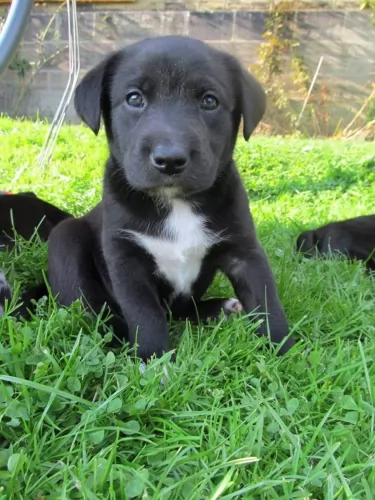 The Borador is a medium to large sized working dog which is well well-proportioned and muscular. His size can’t be carved in stone, but generally he will be in size from 40 – 57cm and weight in the region of 18 and 26 kg. His coat can vary significantly, leaning more towards one particular breed than the other. So the coat can be short and smooth or long and wavy or straight.
The Borador is a medium to large sized working dog which is well well-proportioned and muscular. His size can’t be carved in stone, but generally he will be in size from 40 – 57cm and weight in the region of 18 and 26 kg. His coat can vary significantly, leaning more towards one particular breed than the other. So the coat can be short and smooth or long and wavy or straight.
The Borador essentially has medium-sized ears which are floppy and the tail is medium-length. Sometimes the Borador will have the black and white coat of the Border Collie or he could have a brownish/beige colour from a golden Labrador.
When your energetic Borador is trained and socialized, he becomes a great family member and he gets on well with children and other pets.You’ll find that he often has the sweet, amicable temperament of the Labrador while having the sharp, alert intellect of the Border Collie.
Most Boradors are also good watchdogs and will bark at strangers, but because they are so amicable, from barking, they can quickly become a stranger’s friend.
 The Chinook is a muscular dog, making him a perfect fit to be a sled dog or a hauler of any type. He has a deep chest and powerful muzzle with enduring teeth. The ears can be pricked up or bent and wind-blown. The nostrils of the Chinook are solid black and wide, while the lips are black, the eyes look like almonds and are dark with intelligence in their glance. The feet are firm and oval, the pads cushioned and with dark pigmentation. The tail should not be docked.
The Chinook is a muscular dog, making him a perfect fit to be a sled dog or a hauler of any type. He has a deep chest and powerful muzzle with enduring teeth. The ears can be pricked up or bent and wind-blown. The nostrils of the Chinook are solid black and wide, while the lips are black, the eyes look like almonds and are dark with intelligence in their glance. The feet are firm and oval, the pads cushioned and with dark pigmentation. The tail should not be docked.
The breed has a double coat and hair of medium length The undercoat is soft and thick while the outercoat is close to the body and coarse. The Chinook is usually a tawny, reddish color.
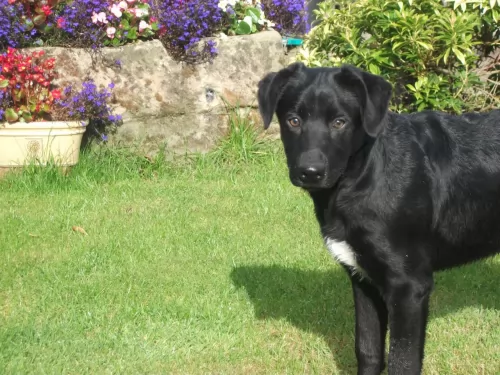 The Borador is an intelligent dog that can be trained. He is a sociable dog and is friendly to all members of his human family, willing to extend a paw of friendship to strangers as well.
The Borador is an intelligent dog that can be trained. He is a sociable dog and is friendly to all members of his human family, willing to extend a paw of friendship to strangers as well.
The Borador is also a friend of children and other pets. This combination of breeds is very energetic and you can’t just leave him for days on end in the backyard. He will need exercise and walks as well as ball games. When you become involved in his games, you tighten the bond between you and this is what this social, outgoing dog loves.
The Borador is going to make a wonderful pet because he is a mix of two very popular dog breeds. Give him all he deserves as a member of your family and you’ll have the perfect friend and companion for life.
 This is a playful, affectionate and loyal breed. They have a special love for kids and always want to learn and please you. They are intelligent and very trainable. The Chinook is good with other dogs and as a sled dog they love to work in packs. They can be reserved but they are never aggressive or shy.
This is a playful, affectionate and loyal breed. They have a special love for kids and always want to learn and please you. They are intelligent and very trainable. The Chinook is good with other dogs and as a sled dog they love to work in packs. They can be reserved but they are never aggressive or shy.
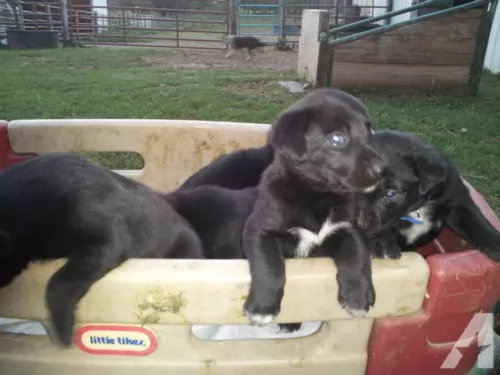 You won’t find serious health problems with your Boradors, as he is a robust breed. Nonetheless, there are some ailments that as a dog owner, you need to be aware of for your Borador.
You won’t find serious health problems with your Boradors, as he is a robust breed. Nonetheless, there are some ailments that as a dog owner, you need to be aware of for your Borador.
Skin ailments – you don’t want to see your dog scratching or licking continuously so you want to be aware of things like parasites and allergies. Skin diseases can be debilitating for a dog and can even require lifelong treatments. Yes, corticosteroids can help with itchy rashes, but the best move is to try and avoid skin ailments by ensuring a nutritious diet rich in minerals and vitamins and which includes some raw meat.
Always be checking your pet for skin problems such as ringworm, caused by a fungus and found on your dog and which appear as scaly patches and hair loss.
Hip Dysplasia – an inherited problem with the hip joints. No-one can predict when hip dysplasia settles in, but it can be as early as 4 months of age.Your dog shows signs of stiffness and may not be his energetic self. Some dog owners want to see certificates first that the parents of puppies have been hip-cleared before they buy a puppy.
 For the most part, the Chinook is a healthy dog. There are however some issues they do have to contend with including:
For the most part, the Chinook is a healthy dog. There are however some issues they do have to contend with including:
Sometimes know as Chinook seizures this is really a movement disorder and perhaps not a true epilepsy.
This dermatitis may be hereditary. It causes itchy skin and is actual an immune system issue.
Chinook are known for a variety of gastrointestinal disorders manifested by diarrhea and vomiting.
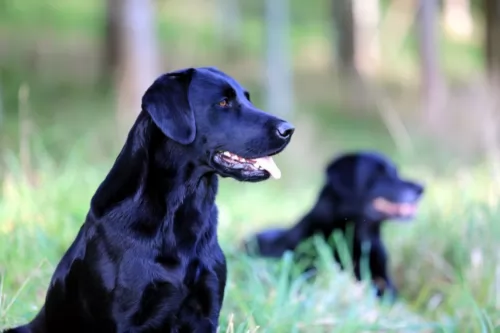 The Borador may have inherited the moderate shedder characteristics of the Border Collie or the more intense shedding of the Labrador Retriever. He will require a good brush at least twice a week to ensure you remove loose hairs so as to keep his coat shiny and healthy. Check your dogs ears too for yeast infections.
The Borador may have inherited the moderate shedder characteristics of the Border Collie or the more intense shedding of the Labrador Retriever. He will require a good brush at least twice a week to ensure you remove loose hairs so as to keep his coat shiny and healthy. Check your dogs ears too for yeast infections.
Puppies and young Boradors are full of energy and they will require a diet that has an excellent protein content. If you’re unsure about how to feed your Borador, speak to your vet as some dogs need more calories depending on their level of activity.
Certainly if your dog has allergies, you may have to look for a special diet but otherwise a top brand commercial dog food can be a good choice if you include some home prepared food such as rice, vegetables and meat. It is important to give your dog some raw meat every now and then as well. Always have a bowl of cool, fresh water available for your pet 24/7.
 Don’t overfeed your dog. Based on how hard he is working for you feed twice a day. Dividing 3 to 5 cups into two meals.
Don’t overfeed your dog. Based on how hard he is working for you feed twice a day. Dividing 3 to 5 cups into two meals.
Although the Chinook is still active in recreational sledding, he is mostly a family pet these days. Given this the Chinook need a good deal of exercise and competition. They are great at search and rescue, dog packing, agility, obedience, herding, carting and skijoring. They need some form of solid exercise for 30 to 60 minutes every day.